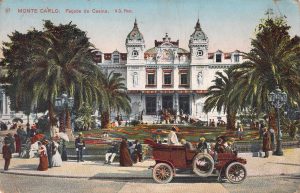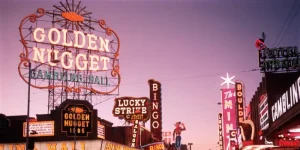
The History of Offline Casinos From Gambling Houses to Global Entertainment Icons

Casinos have long been associated with glamour, entertainment, and the thrill of luck. While the digital era has popularized online gambling platforms, the charm of offline casinos remains unmatched. From the neon-lit streets of Las Vegas to the grand halls of Monte Carlo, brick-and-mortar casinos hold a rich and fascinating history that reflects shifts in culture, society, and technology.
The Origins: Traditional Gambling Houses

The earliest forms of gambling can be traced back thousands of years. Archaeological evidence suggests that ancient Chinese civilizations were playing betting games as early as 2300 BC. However, the concept of a casino as we know it today began to take shape in Europe.
The word “casino” is derived from the Italian term casa, meaning “little house.” In the 17th century, it referred to a small villa or country house used for leisure and social gatherings. Some of these villas included special rooms for music, dancing, and gambling — and over time, they evolved into more organized and regulated gambling venues.
One of the earliest known casinos is the Casino di Venezia in Italy, which opened in 1638. Initially established to control gambling during the annual carnival in Venice, this institution marked the beginning of a more structured and official form of gambling entertainment. The idea of the casino soon spread throughout Europe.
The European Golden Age: Monte Carlo Rises

The 19th century saw the golden age of casinos in Europe. The most iconic among them is the Casino de Monte-Carlo in Monaco, which opened its doors in 1863. Designed not just as a gambling venue but also as a center of high-society entertainment, the Monte Carlo casino became a symbol of elegance and exclusivity.
Lavishly decorated with Belle Époque architecture, uniformed service staff, and luxurious facilities, Monte Carlo attracted royalty, aristocrats, and international celebrities. This model of casino — combining luxury, entertainment, and gambling — set the standard for future developments around the world.
The American Revolution: Las Vegas Takes Over

While Europe laid the foundation of casinos as elegant social venues, the United States transformed them into mass-market entertainment hubs. Las Vegas, located in the Nevada desert, became the epicenter of the modern casino revolution in the 20th century.
After Nevada legalized gambling in 1931, Las Vegas quickly grew into the world’s gambling capital. One of the first major casinos, the Flamingo Hotel, was opened by infamous mobster Bugsy Siegel. His vision of a resort-style casino launched an entire era of massive entertainment complexes.
Las Vegas casinos came to represent the modern casino experience: bright lights, rows of slot machines, five-star hotels, gourmet restaurants, and world-class live performances. It was no longer just about betting — it was about a full entertainment package.
Asia’s Casino Boom: The Rise of Macau
While Las Vegas reigned in the West, Macau emerged as Asia’s answer to high-stakes gambling. A former Portuguese colony, Macau legalized gambling in the early 20th century. However, its casino industry exploded after the government opened the market to foreign operators in 2002.
Today, Macau generates more gambling revenue than Las Vegas, thanks to its luxurious casino resorts such as The Venetian Macao and City of Dreams. Combining Western-style resorts with Asian cultural elements, Macau has become a global destination for high rollers, tourists, and business travelers alike.
Read More : Supreme Casino Sites Dominating In 2025
The Offline Casino in the Digital Age
Despite the rise of online gambling platforms, offline casinos continue to thrive, and for good reason. The physical atmosphere of a casino offers a sensory and social experience that cannot be replicated online. The sounds of clinking coins, the vibrant lights, the human interaction with dealers and other players — all contribute to an irreplaceable sense of excitement.
Many modern casinos have also embraced technology, incorporating AI-powered security systems, RFID-enabled chips, and interactive gaming tables. Some even offer mobile apps and digital loyalty programs to enhance customer engagement while retaining the authentic feel of a classic casino.
Conclusion: More Than Just Gambling
Offline casinos are not just places to gamble — they are cultural icons, architectural marvels, and entertainment centers. From small gambling houses in 17th-century Venice to ultra-modern resorts in Macau and Las Vegas, the evolution of casinos reflects humanity’s enduring fascination with risk, reward, and social experience.
As long as people seek entertainment that combines thrill, luxury, and human interaction, offline casinos will remain a timeless destination — where luck meets lifestyle in the most spectacular way.







